test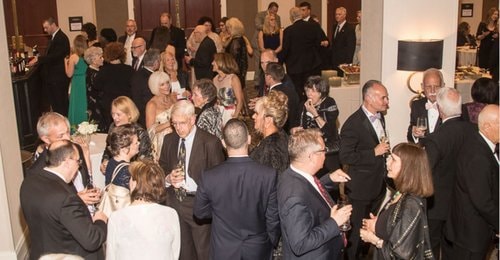 A beacon of care and stability. A model for change.
A beacon of care and stability. A model for change.
This is the Homeland Center that was celebrated on May 7, 2017, when Homeland’s many friends gathered to celebrate the 150th anniversary of a storied Harrisburg institution.
Homeland’s 150th anniversary gala, held at the Hilton Harrisburg, was noted for its elegance, its reverence for the past, and its confidence in a bright future.
In 1867, 18 Harrisburg women pooled their energies and talents to create “The Home for the Friendless.” Originally meant to shelter Civil War widows and orphans, it evolved over 150 years to become Homeland Center, the region’s premier Continuing Care Retirement Community and service provider.
Few central Pennsylvania organizations can boast the longevity of Homeland, and the anniversary event attracted 400 people representing all corners of the region’s business, culture, and nonprofit segments.
Co-chairs John K. Stark and Marion Alexander kicked off the festivities, with Stark sharing his deep family ties to Homeland. His grandmother, Katherine “Kitty” Kunkel, was president of the Board of Managers, instrumental in instilling Homeland’s lasting commitment to the residents’ comfort and someone who “truly loved Homeland and passed that appreciation to me.” Grandfather Congressman John Crain Kunkel grew up behind Market Square Presbyterian Church, original meeting place of Homeland’s founders.
The night’s featured guest, retired CBS News Sunday Morning host Charles Osgood, entertained the crowd with songs at the piano and memories of his career in the news business. He opened by saying that he is “agape at the significant achievement you are celebrating tonight.”
“What you have done here for all this time is so effective and so beautiful that it should be a model for the rest of this country,” he said.
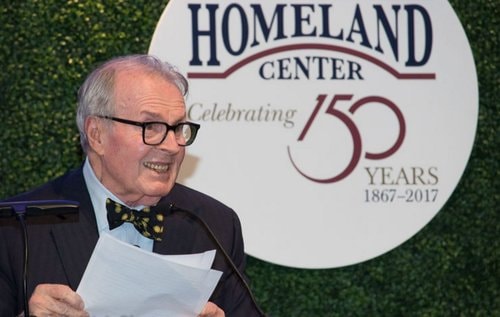 He said that he had met Homeland residents earlier that day and played piano for them, too. There was one song he particularly wanted to play, he said, before launching into “Happy Birthday.” By the time he reached “Happy birthday, dear Homeland,” the crowd was singing along.
He said that he had met Homeland residents earlier that day and played piano for them, too. There was one song he particularly wanted to play, he said, before launching into “Happy Birthday.” By the time he reached “Happy birthday, dear Homeland,” the crowd was singing along.
Board of Trustees Chair Morton Spector mused on “how amazed and how proud Homeland’s founders would be today. In a time without a social safety net, they had the vision to create a new beacon of caring. Today, that commitment guides us in a host of ways.”
Last year, Spector said, Homeland provided almost $3 million in charitable care, “and no resident in financial distress has ever been asked to leave.” He offered a toast “to all who have given their passion for service as a gift to our community.”
Gala guests were entertained by the renowned Steve Rudolph Trio, with jazzman Rudolph at the piano. He also accompanied entertainers Rick Stevens and Debbie Smith, singing reflections on Homeland’s unique nature to the tunes of such familiar songs as “New York, New York.”
“Our mission is prime. Our care is sublime. And I’ll make sure you’re part of it, Homeland, Homeland!” Stevens sang.
A custom-produced video spanned Homeland’s history, from its founding in the wake of the Civil War, to its expansion into today’s comprehensive service provider, featuring personal care suites, skilled nursing care, dementia unit, and hospice, home health, and home care services. The expansive facility is crowned by its hallmark circular conservatory, part of the 24-bed dementia unit.
“Seen at night, the conservatory’s glowing panes mark Homeland as a true beacon of care,” the video narrator noted.
Homeland’s founders – those 18 women and the seven-member Board of Trustees charged with business and financial matters – “didn’t start with any money. They started with a conviction,” said President and CEO Barry S. Ramper II. “They started with principles they believed in. They then acted upon those principles.”
Homeland has survived 150 years because “thousands of individuals have not wavered on those convictions,” Ramper added. The entire staff is outstanding, not only because of their skill sets, “but because they have a heart that is second to none.”
The founders made wise decisions that allowed Homeland Center, plus the more recent creations of Homeland Hospice, Homeland HomeCare, and Homeland HomeHealth, to thrive by staying true to “the original, fundamental, total commitment they had 150 years ago,” he said.
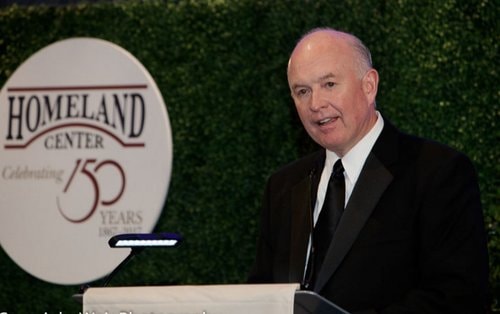 “They made something that today we only have a responsibility to make stronger,’’ Ramper said. “Fifty years or 100 years from now, our names are meaningless, but the goal is for it to be able to be said by someone 100 years from now, ‘They did a good job in 2017 in preparing us for the world we’re in today,’ just as those in 1867 did an outstanding job in preparing the world that we are in.”
“They made something that today we only have a responsibility to make stronger,’’ Ramper said. “Fifty years or 100 years from now, our names are meaningless, but the goal is for it to be able to be said by someone 100 years from now, ‘They did a good job in 2017 in preparing us for the world we’re in today,’ just as those in 1867 did an outstanding job in preparing the world that we are in.”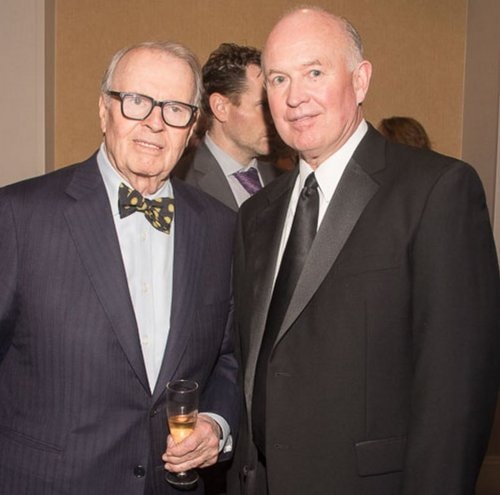
As the evening closed, Stark announced that the event had been a success “in more ways than one,” spotlighting not just the milestone anniversary but Homeland’s adherence to benevolent care, which the gala benefited, providing care even when residents run out of resources.
“Homeland Center exists because of our community generosity and willingness to help others,” said Stark. “For our residents and their families, words cannot fully express join in knowing their loved ones have a safe and secure home.”
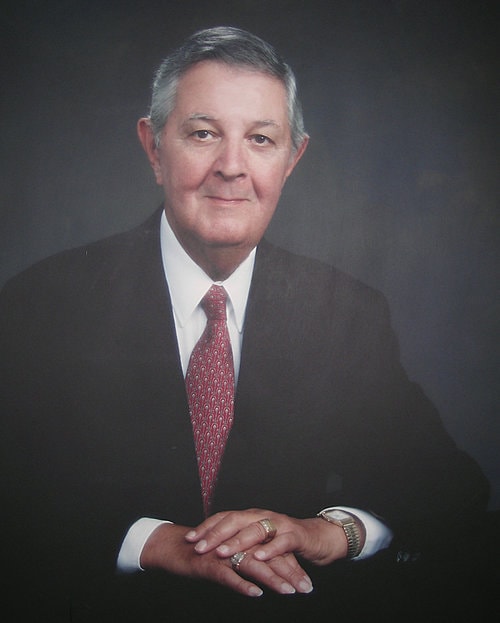 The passing of Benjamin Olewine III on May 27 saddened the Homeland Center family. Ben’s generosity touched many residents as well as the entire Harrisburg community in ways big and small.
The passing of Benjamin Olewine III on May 27 saddened the Homeland Center family. Ben’s generosity touched many residents as well as the entire Harrisburg community in ways big and small.

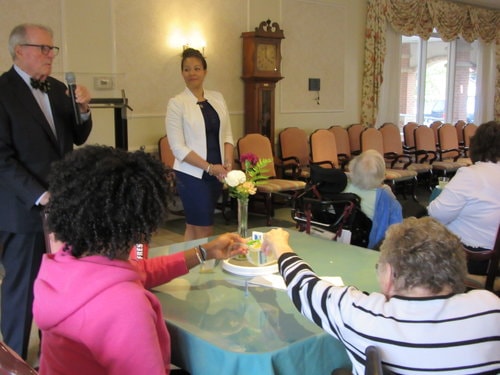
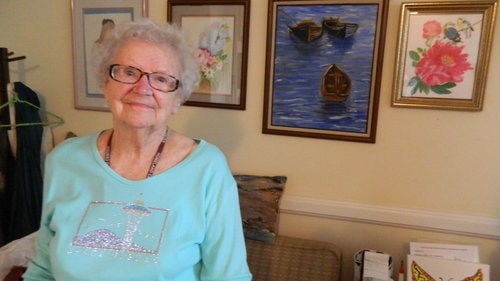 Betty Wise enjoys sharing her paintings with family and friends, but there is one painting she will never give away. It’s her first, a view of rowboats on a shimmering blue ocean. She copied from a picture in a book and after she had finished, Betty’s art teacher said, “You’re going to be a painter.”
Betty Wise enjoys sharing her paintings with family and friends, but there is one painting she will never give away. It’s her first, a view of rowboats on a shimmering blue ocean. She copied from a picture in a book and after she had finished, Betty’s art teacher said, “You’re going to be a painter.”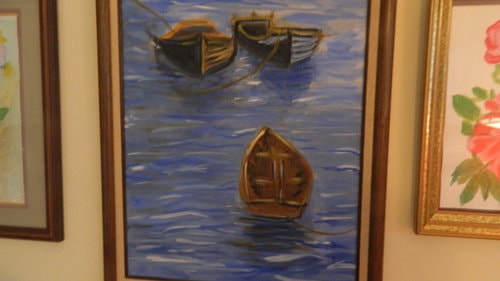 Betty discovered her artistic side when she was in Delaware, where she and Pat would go crabbing and fishing for 15 years after they retired. She met an art teacher who invited Betty to join a class, where Betty produced the boat painting that still hangs on the wall in her Homeland personal care suite.
Betty discovered her artistic side when she was in Delaware, where she and Pat would go crabbing and fishing for 15 years after they retired. She met an art teacher who invited Betty to join a class, where Betty produced the boat painting that still hangs on the wall in her Homeland personal care suite. of big flower that Betty wanted to paint.
of big flower that Betty wanted to paint. A beacon of care and stability. A model for change.
A beacon of care and stability. A model for change. He said that he had met Homeland residents earlier that day and played piano for them, too. There was one song he particularly wanted to play, he said, before launching into “Happy Birthday.” By the time he reached “Happy birthday, dear Homeland,” the crowd was singing along.
He said that he had met Homeland residents earlier that day and played piano for them, too. There was one song he particularly wanted to play, he said, before launching into “Happy Birthday.” By the time he reached “Happy birthday, dear Homeland,” the crowd was singing along. “They made something that today we only have a responsibility to make stronger,’’ Ramper said. “Fifty years or 100 years from now, our names are meaningless, but the goal is for it to be able to be said by someone 100 years from now, ‘They did a good job in 2017 in preparing us for the world we’re in today,’ just as those in 1867 did an outstanding job in preparing the world that we are in.”
“They made something that today we only have a responsibility to make stronger,’’ Ramper said. “Fifty years or 100 years from now, our names are meaningless, but the goal is for it to be able to be said by someone 100 years from now, ‘They did a good job in 2017 in preparing us for the world we’re in today,’ just as those in 1867 did an outstanding job in preparing the world that we are in.”
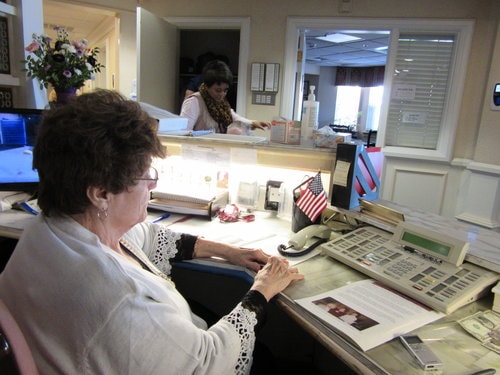 For 49 years, Pauline Neal delivers joy!
For 49 years, Pauline Neal delivers joy!
